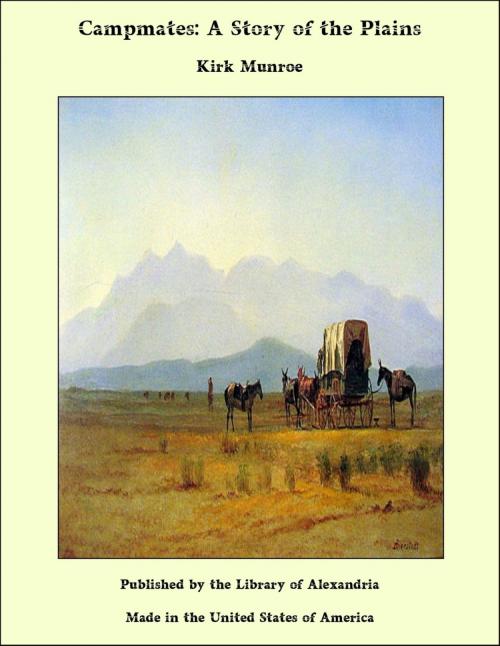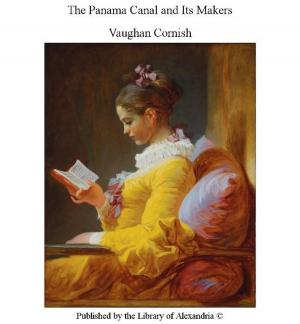Campmates: A Story of the Plains
Nonfiction, Religion & Spirituality, New Age, History, Fiction & Literature| Author: | Kirk Munroe | ISBN: | 9781465624666 |
| Publisher: | Library of Alexandria | Publication: | March 8, 2015 |
| Imprint: | Language: | English |
| Author: | Kirk Munroe |
| ISBN: | 9781465624666 |
| Publisher: | Library of Alexandria |
| Publication: | March 8, 2015 |
| Imprint: | |
| Language: | English |
Slowly and heavily the train rumbled on through the night. It was called an express; but the year was long ago, in the early days of railroading, and what was then an express would now be considered a very slow and poky sort of a train. On this particular night too, it ran more slowly than usual, because of the condition of the track. The season was such a wet one, that even the oldest traveller on the train declared he could not remember another like it. Rain, rain, rain, day after day, for weeks, had been the rule of that spring, until the earth was soaked like a great sponge. All the rivers had overflowed their banks, and all the smaller streams were raging torrents, red, yellow, brown, and sometimes milky white, according to the color of the clays through which they cut their riotous way. The lowlands and meadows were flooded, so that the last year's hay-stacks, rising from them here and there, were veritable islands of refuge for innumerable rabbits, rats, mice, and other small animals, driven by the waters from their homes. And all this water had not helped the railroad one bit. In the cuts the clay or gravel banks were continually sliding down on the track; while on the fills they were as continually sliding out from under it. The section gangs were doubled, and along the whole line they were hard at work, by night as well as by day, only eating and sleeping by snatches, trying to keep the track in repair, and the road open for traffic. In spite of their vigilance and unceasing labor, however, the rains found plenty of chances to work their mischief undetected. Many a time only the keen watchfulness of an engine-driver, or his assistant, the fireman, saved a train from dashing into some gravel heap, beneath which the rails were buried, or from plunging into some yawning opening from which a culvert or small bridge had been washed out. Nor with all this watchfulness did the trains always get through in safety. Sometimes a bit of track, that looked all right, would suddenly sink beneath the weight of a passing train into a quagmire that had been formed beneath it, and then would follow the pitiful scenes of a railroad wreck. So nobody travelled except those who were compelled to do so, and the passenger business of this particular road was lighter than it had been since the opening. It was so light that on this night there were not more than half a dozen persons in the single passenger coach of the express, and only one of these was a woman. Another was her baby, a sturdy, wholesome-looking little fellow, who, though he was but a year old, appeared large enough to be nearly, if not quite, two. He had great brown eyes, exactly like those of his mother. She was young and pretty, but just now she looked utterly worn out, and no wonder. The train was twelve hours late; and, instead of being comfortably established in a hotel, at the end of her journey by rail, as she had expected to be before dark that evening, she was wearily trying to sleep in the same stuffy, jolting car she had occupied all day and had no hope of leaving before morning. There were no sleeping-cars in those days, nor vestibuled trains, nor even cars with stuffed easy-chairs in which one could lie back and make himself comfortable. No, indeed; there were no such luxuries as these for those who travelled by rail at that time. The passenger coaches were just long boxes, with low, almost flat roofs, like those of freight cars. Their windows were small, and generally stuck fast in their frames, so that they could not be opened. There was no other means of ventilation, except as one of the end doors was flung open, when there came such a rush of smoke and cinders and cold air that everybody was impatient to have it closed again.
Slowly and heavily the train rumbled on through the night. It was called an express; but the year was long ago, in the early days of railroading, and what was then an express would now be considered a very slow and poky sort of a train. On this particular night too, it ran more slowly than usual, because of the condition of the track. The season was such a wet one, that even the oldest traveller on the train declared he could not remember another like it. Rain, rain, rain, day after day, for weeks, had been the rule of that spring, until the earth was soaked like a great sponge. All the rivers had overflowed their banks, and all the smaller streams were raging torrents, red, yellow, brown, and sometimes milky white, according to the color of the clays through which they cut their riotous way. The lowlands and meadows were flooded, so that the last year's hay-stacks, rising from them here and there, were veritable islands of refuge for innumerable rabbits, rats, mice, and other small animals, driven by the waters from their homes. And all this water had not helped the railroad one bit. In the cuts the clay or gravel banks were continually sliding down on the track; while on the fills they were as continually sliding out from under it. The section gangs were doubled, and along the whole line they were hard at work, by night as well as by day, only eating and sleeping by snatches, trying to keep the track in repair, and the road open for traffic. In spite of their vigilance and unceasing labor, however, the rains found plenty of chances to work their mischief undetected. Many a time only the keen watchfulness of an engine-driver, or his assistant, the fireman, saved a train from dashing into some gravel heap, beneath which the rails were buried, or from plunging into some yawning opening from which a culvert or small bridge had been washed out. Nor with all this watchfulness did the trains always get through in safety. Sometimes a bit of track, that looked all right, would suddenly sink beneath the weight of a passing train into a quagmire that had been formed beneath it, and then would follow the pitiful scenes of a railroad wreck. So nobody travelled except those who were compelled to do so, and the passenger business of this particular road was lighter than it had been since the opening. It was so light that on this night there were not more than half a dozen persons in the single passenger coach of the express, and only one of these was a woman. Another was her baby, a sturdy, wholesome-looking little fellow, who, though he was but a year old, appeared large enough to be nearly, if not quite, two. He had great brown eyes, exactly like those of his mother. She was young and pretty, but just now she looked utterly worn out, and no wonder. The train was twelve hours late; and, instead of being comfortably established in a hotel, at the end of her journey by rail, as she had expected to be before dark that evening, she was wearily trying to sleep in the same stuffy, jolting car she had occupied all day and had no hope of leaving before morning. There were no sleeping-cars in those days, nor vestibuled trains, nor even cars with stuffed easy-chairs in which one could lie back and make himself comfortable. No, indeed; there were no such luxuries as these for those who travelled by rail at that time. The passenger coaches were just long boxes, with low, almost flat roofs, like those of freight cars. Their windows were small, and generally stuck fast in their frames, so that they could not be opened. There was no other means of ventilation, except as one of the end doors was flung open, when there came such a rush of smoke and cinders and cold air that everybody was impatient to have it closed again.















